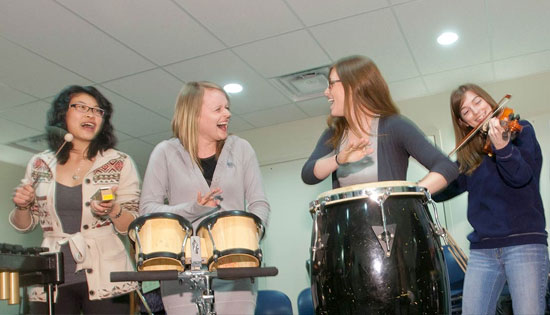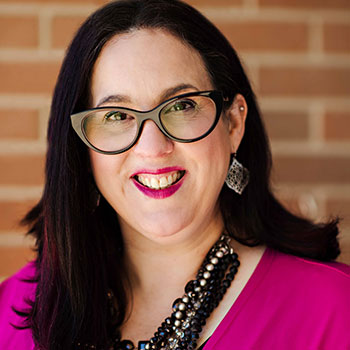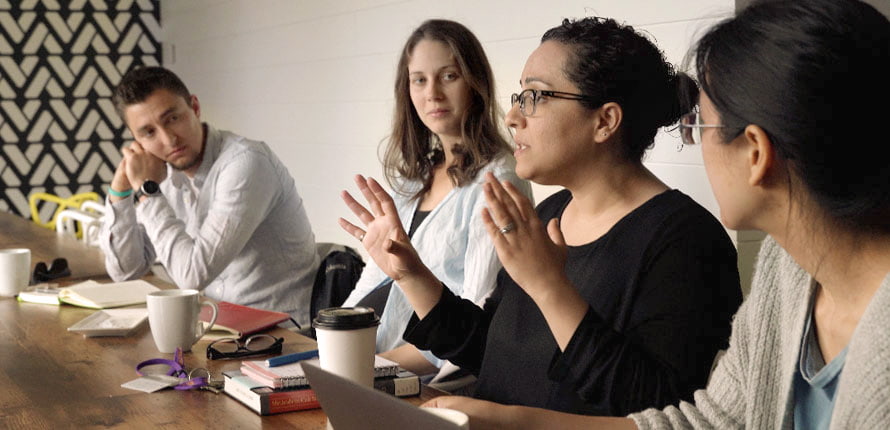Search for academic programs, residence, tours and events and more.
Our Master of Music Therapy (MMT) is the longest-running graduate music therapy degree in Canada. The philosophy of our program centres around music psychotherapy, clinical musicianship and psychotherapeutic techniques, which are developed through clinical, theoretical and experiential practices.
The MMT is offered full time as a two-year program with a one-year option for individuals who hold a Bachelor of Music Therapy.

Within the philosophy of music psychotherapy, our Master of Music Therapy provides a creative learning environment for you to develop your clinical musicianship and music therapy/psychotherapy skills along with the safe and effective use of self through reflexive practices and clinical work. You will learn to conduct both evidence-based and practice-based research.
The Master of Music Therapy curriculum is designed to give opportunities for advanced clinical education and the learning of contemporary clinical theories which will lead to the development of music therapy knowledge, skills and attitudes.
The program helps students gain an understanding of the major clinical theories and philosophies of practice and of current Canadian and international music therapy trends. The program also illuminates and emphasizes the balance between music and therapy.
Fall:
Winter:
Spring:
Fall:
Winter:
Spring:
Our one-year program has two fields students can choose according to their interests and future plans:
Fall:
Winter:
Spring:
Fall:
Winter:
Spring:
Placement courses are linked with classroom courses so that you can make connections between music therapy/music psychotherapy theories and practices. You will be able to work with a variety of client populations throughout your various placements.
The two-year Master of Music Therapy requires five music psychotherapy placements. The first placement takes place at Laurier’s on-site clinic and in the community. The second placement is a full-time, three-month internship (spring term) at an off-campus setting. In the final year of the two-year program, there are two one-day-per-week placements (fall and winter terms), and a full-time, three-month internship (spring term) at an off-campus setting.
Students in the one-year Master of Music Therapy (music psychotherapy field) will take MU610.
Qualified and experienced music therapists supervise all placements. Audio, video and editing facilities at Laurier enable you to conduct music therapy assessments and analyze clinical improvisation within psychotherapeutic processes.
Our Master of Music Therapy courses will develop your knowledge and skills in the following areas.
Based on your research interests, you will conduct a Major Research Paper (MRP) with the option of doing an original research study or clinical case study.
We teach both evidence-based and practice-based research and offer supervision expertise in qualitative, clinical, arts-based and music medicine research.
The Manfred and Penny Conrad Institute for Music Therapy Research (CIMTR) offers Research Assistantship opportunities for several students every year. We also offer Teaching Assistantship opportunities for our students.
If you are interested, you can conduct your study at the Improvisation Analysis and Low Frequency Sound Laboratory. We have the only clinical improvisation analysis and low frequency lab in Canada, established in 2013 for improvisation and low frequency sound research. The clinic is funded through the CIMTR.
Our cutting-edge equipment includes Matlab, Logic Software, Music Therapy Toolbox, Sound Beam, Mallet Kat-studio, Digital keyboard, drum sets, Physioacoustic chairs, neurofeedback equipment and more.

"Immerse yourself in all Laurier has to offer while completing your graduate education. Enjoy the journey – remember to have fun too!"
Paula C. Fletcher, associate dean, Faculty of Graduate and Postdoctoral Studies
Take the first step in your graduate education and apply to one of our graduate programs. Follow our three-step admission process — we’ll walk you through how to apply and prepare for your first day as a graduate student.
Admission to the Master of Music Therapy is based on the collective results of the information below.
Admission to the Master of Music Therapy is based on the collective results of the information below.
After you have submitted your OUAC application, paid the non-refundable application fee, and Laurier has received your application, you'll receive an email from gradadmissions@wlu.ca advising you to upload the additional required documentation to Laurier’s Online Registration and Information System (LORIS).
Note that the application process and the uploading of supplemental documentation, which includes references, typically takes two weeks. To avoid disappointment, please apply early.
An application for admission to our Master of Music Therapy must include:
Visit our Graduate Admissions Toolkit for more information about applying.
The Master of Music Therapy Admission Committee will review all applications that are received in full by the Jan. 15 deadline. Applications with items received after Jan. 15 will only be reviewed if space allows.
Based on the strength of your application, you may be asked to audition and interview in early February. You may be contacted to establish a date and time. Applicants chosen to audition must submit an audition fee.
Applicants’ level of performance and musicianship is assessed in the audition. Royal Conservatory of Music (RCM) formal training and exams are not required.
You will be asked to perform:
The interview will discuss your interest in graduate music therapy studies at Laurier and knowledge of relevant music therapy topics (e.g., case studies, models, theories, research).
Applicants are encouraged to visit Voices: A World Forum for Music Therapy to explore these music therapy topics. For a music therapy/music psychotherapy reading list, contact choosemusic@wlu.ca.
It is recommended that you audition in person. Alternative audition accommodations may be considered for long-distance applicants.
The courses listed below are accepted as part of the admission requirements in our application checklist. If you do not see your completed or intended course below, email choosemusic@wlu.ca.
Proficiency in written and spoken English is essential to graduate studies at Laurier. Applicants whose language of instruction during their previous postsecondary education was not in English must submit evidence of proficiency in English. If applicable, results from accepted testing services must be uploaded to LORIS.
Questions? Contact Emily Carruthers at ecarruthers@wlu.ca or 548.889.3614.
Regardless of the type of graduate degree program you intend to pursue, financial planning is important. At Laurier, we want to provide you with as much information as possible about a variety of scholarship and funding opportunities and equip you with the skills to manage your finances effectively in the years to come.

Our graduates have gone on to work in health care, education and private practice. Examples of jobs held by our graduates include:
ASPIRE is Laurier's professional skills development training program for graduate students. The program helps you craft an individualized, extracurricular learning plan tailored to your professional journey and entry to the workplace.
Learn about the interests of our faculty members. If you are looking for more information about this program, have questions, or want to set up a meeting, contact a member of our team.
Heidi Ahonen
Professor, Music Therapy
Demian Kogutek
Assistant Professor, Music Therapy
Coordinator, Master of Music Therapy
Director, Manfred and Penny Conrad Institute for Music Therapy Research
Elizabeth Mitchell
Assistant Professor, Music Therapy
Coordinator, Bachelor of Music Therapy